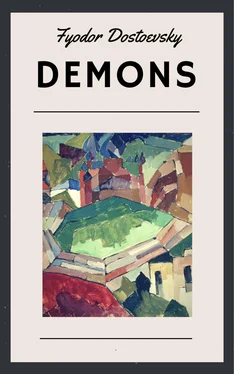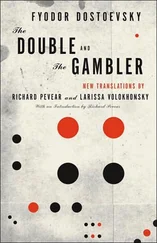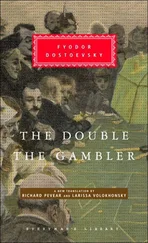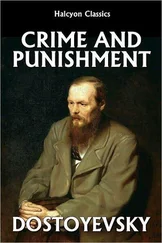Title Page Demons by Fyodor Dostoevsky Translated from the Russian by Constance Garnett “Strike me dead, the track has vanished, Well, what now? We’ve lost the way, Demons have bewitched our horses, Led us in the wilds astray. “What a number! Whither drift they? What’s the mournful dirge they sing? Do they hail a witch’s marriage Or a goblin’s burying?” A. Pushkin. “And there was one herd of many swine feeding on this mountain; and they besought him that he would suffer them to enter into them. And he suffered them. “Then went the devils out of the man and entered into the swine; and the herd ran violently down a steep place into the lake and were choked. “When they that fed them saw what was done, they fled, and went and told it in the city and in the country. “Then they went out to see what was done; and came to Jesus and found the man, out of whom the devils were departed, sitting at the feet of Jesus, clothed and in his right mind; and they were afraid.” Luke, ch. viii. 32-37.
PART I
CHAPTER I. INTRODUCTORY
CHAPTER II. PRINCE HARRY. MATCHMAKING.
CHAPTER III. THE SINS OF OTHERS
CHAPTER IV. THE CRIPPLE
CHAPTER V. THE SUBTLE SERPENT
PART II
CHAPTER I. NIGHT
CHAPTER II. NIGHT (continued)
CHAPTER III. THE DUEL
CHAPTER IV. ALL IN EXPECTATION
CHAPTER V. ON THE EVE OF THE FETE
CHAPTER VI. PYOTR STEPANOVITCH IS BUSY
CHAPTER VII. A MEETING
CHAPTER VIII. IVAN THE TSAREVITCH
CHAPTER IX. A RAID AT STEPAN TROFIMOVITCH’S
CHAPTER X. FILIBUSTERS. A FATAL MORNING
PART III
CHAPTER I. THE FETE—FIRST PART
CHAPTER II. THE END OF THE FETE
CHAPTER III. A ROMANCE ENDED
CHAPTER IV. THE LAST RESOLUTION
CHAPTER V. A WANDERER
CHAPTER VI. A BUSY NIGHT
CHAPTER VII. STEPAN TROFIMOVITCH’S LAST WANDERING
CHAPTER VIII. CONCLUSION
Imprint
Demons
by Fyodor Dostoevsky
Translated from the Russian by Constance Garnett
“Strike me dead, the track has vanished,
Well, what now? We’ve lost the way,
Demons have bewitched our horses,
Led us in the wilds astray.
“What a number! Whither drift they?
What’s the mournful dirge they sing?
Do they hail a witch’s marriage
Or a goblin’s burying?”
A. Pushkin.
“And there was one herd of many swine feeding on this
mountain; and they besought him that he would suffer them to
enter into them. And he suffered them.
“Then went the devils out of the man and entered into the
swine; and the herd ran violently down a steep place into
the lake and were choked.
“When they that fed them saw what was done, they fled, and
went and told it in the city and in the country.
“Then they went out to see what was done; and came to Jesus
and found the man, out of whom the devils were departed,
sitting at the feet of Jesus, clothed and in his right mind;
and they were afraid.”
Luke, ch. viii. 32-37.
SOME DETAILS OF THE BIOGRAPHY OF THAT HIGHLY RESPECTED GENTLEMAN STEPAN TROFIMOVITCH VERHOVENSKY.
I
IN UNDERTAKING to describe the recent and strange incidents in our town, till lately wrapped in uneventful obscurity, I find myself forced in absence of literary skill to begin my story rather far back, that is to say, with certain biographical details concerning that talented and highly-esteemed gentleman, Stepan Trofimovitch Verhovensky. I trust that these details may at least serve as an introduction, while my projected story itself will come later.
I will say at once that Stepan Trofimovitch had always filled a particular rôle among us, that of the progressive patriot, so to say, and he was passionately fond of playing the part—so much so that I really believe he could not have existed without it. Not that I would put him on a level with an actor at a theatre, God forbid, for I really have a respect for him. This may all have been the effect of habit, or rather, more exactly of a generous propensity he had from his earliest years for indulging in an agreeable day-dream in which he figured as a picturesque public character. He fondly loved, for instance, his position as a “persecuted” man and, so to speak, an “exile.” There is a sort of traditional glamour about those two little words that fascinated him once for all and, exalting him gradually in his own opinion, raised him in the course of years to a lofty pedestal very gratifying to vanity. In an English satire of the last century, Gulliver, returning from the land of the Lilliputians where the people were only three or four inches high, had grown so accustomed to consider himself a giant among them, that as he walked along the streets of London he could not help crying out to carriages and passers-by to be careful and get out of his way for fear he should crush them, imagining that they were little and he was still a giant. He was laughed at and abused for it, and rough coachmen even lashed at the giant with their whips. But was that just? What may not be done by habit? Habit had brought Stepan Trofimovitch almost to the same position, but in a more innocent and inoffensive form, if one may use such expressions, for he was a most excellent man.
I am even inclined to suppose that towards the end he had been entirely forgotten everywhere; but still it cannot be said that his name had never been known. It is beyond question that he had at one time belonged to a certain distinguished constellation of celebrated leaders of the last generation, and at one time—though only for the briefest moment—his name was pronounced by many hasty persons of that day almost as though it were on a level with the names of Tchaadaev, of Byelinsky, of Granovsky, and of Herzen, who had only just begun to write abroad. But Stepan Trofimovitch’s activity ceased almost at the moment it began, owing, so to say, to a “vortex of combined circumstances.” And would you believe it? It turned out afterwards that there had been no “vortex” and even no “circumstances,” at least in that connection. I only learned the other day to my intense amazement, though on the most unimpeachable authority, that Stepan Trofimovitch had lived among us in our province not as an “exile” as we were accustomed to believe, and had never even been under police supervision at all. Such is the force of imagination! All his life he sincerely believed that in certain spheres he was a constant cause of apprehension, that every step he took was watched and noted, and that each one of the three governors who succeeded one another during twenty years in our province came with special and uneasy ideas concerning him, which had, by higher powers, been impressed upon each before everything else, on receiving the appointment. Had anyone assured the honest man on the most irrefutable grounds that he had nothing to be afraid of, he would certainly have been offended. Yet Stepan Trofimovitch was a most intelligent and gifted man, even, so to say, a man of science, though indeed, in science … well, in fact he had not done such great things in science. I believe indeed he had done nothing at all. But that’s very often the case, of course, with men of science among us in Russia.
He came back from abroad and was brilliant in the capacity of lecturer at the university, towards the end of the forties. He only had time to deliver a few lectures, I believe they were about the Arabs; he maintained, too, a brilliant thesis on the political and Hanseatic importance of the German town Hanau, of which there was promise in the epoch between 1413 and 1428, and on the special and obscure reasons why that promise was never fulfilled. This dissertation was a cruel and skilful thrust at the Slavophils of the day, and at once made him numerous and irreconcilable enemies among them. Later on—after he had lost his post as lecturer, however—he published (by way of revenge, so to say, and to show them what a man they had lost) in a progressive monthly review, which translated Dickens and advocated the views of George Sand, the beginning of a very profound investigation into the causes, I believe, of the extraordinary moral nobility of certain knights at a certain epoch or something of that nature.
Читать дальше












